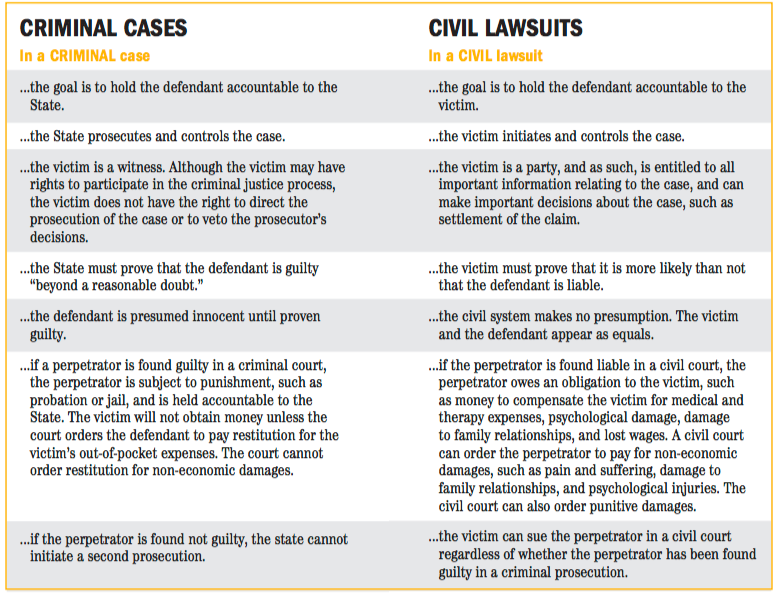When facing online harassment, you may be considering pursuing legal action. Here we outline some basics to help you make an informed decision.
Many states have laws that may apply to cases of online harassment. These laws generally reference “cyber harassment” or “cyberstalking.” In some cases, laws pertaining to offline harassment and stalking have been amended to include online activity.

Image courtesy of Right To Be
Criminal Cases
In a criminal case, a prosecutor works with law enforcement to file the case in court, where they represent the interests of the state rather than directly representing your interests. If an online abuser is brought to criminal court, they are tried for breaking a specific law. Possible criminal cases related to online harassment include cyberstalking and the distribution of nonconsensual intimate imagery.
You are considered a witness in criminal cases, but you won’t have the power to commence or continue a case. The idea is that the state is taking retribution against the defendant for violating the law, which is not only harmful to you as an individual, but also to society as a whole. It is up to law enforcement and prosecutors to decide whether they consider a case important enough to file and if so, whether to enter a plea bargain with the defendant.
If a case is brought and the offender takes a plea bargain or is convicted, you can often secure a criminal restraining order that prohibits the offender from contacting you for a period of time. Generally victims in criminal cases do not have lawyers, so criminal cases can be cost effective if the ultimate desire is for the offender to be punished and to leave you alone.
Civil Cases
A civil case, on the other hand, seeks to settle disputes directly between people and/or institutions. In simple terms, the plaintiff (you) generally brings a lawsuit asking the court to require the defendant (your online abuser) to compensate you financially for the harm done to you and/or to stop doing something.
In a civil case, you (and your lawyer) are in control of all of the major decisions: whether or not to sue, settle, or take a case to trial. Possible civil claims related to online harassment include defamation, invasion of privacy, and intentional infliction of emotional distress.
Victims can bring civil suits to deanonymize an online abuser. A victim can also sue for a restraining order so the offender will be court-ordered to leave the victim alone (you can find more information on the Restraining Orders section of this Field Manual). Often victims want to sue to ensure that the abuser stops saying something. However, though courts are willing to adjudicate statements already said, they will almost never rule to stop somebody from saying something in the future. Stopping future speech is an unconstitutional “prior restraint.”
Whether or not you have a viable criminal or civil case can only be determined by consulting law enforcement and/or a lawyer. Take a look at the Legal Resources and Engaging with Law Enforcement sections of this Field Manual.
Federal v. State Laws
While both federal and state laws can be relevant to online harassment, most applicable laws are found at the state level. Federal laws concern electronic communication across state lines or using a channel of interstate communication (such as telephones or the internet). Reporting online harassment crimes under federal law will involve federal agencies such as the FBI.
State laws generally contain specific provisions on activities such as harassment, stalking, and the distribution of nonconsensual intimate imagery, as well as mechanisms for seeking a restraining order. Reporting online harassment crimes under state law will involve local law enforcement. You should consult a lawyer in the state you live in to determine whether you can or should bring a case in your state or another state.
Realities and Challenges
While it is possible to seek legal remedies to online harassment in civil or criminal court, it’s important to understand that, in practice, it can be challenging, time-consuming, and costly. It can be difficult for law enforcement officials to investigate cases of cyberstalking or cyber harassment, or to successfully prosecute someone for online behavior. Local law enforcement officials may have difficulty identifying the perpetrator or taking action, especially if the perpetrator does not live in your state. Furthermore, they may not always be familiar with state and federal laws pertaining to online abuse or with the nuances of how online platforms can be used to target people.
Another reason it can be difficult to bring a criminal case against an online abuser is that the First Amendment to the U.S. Constitution ensures some of the strongest free speech protections in the world. Expressions of hate or disparagement toward individuals and groups are not generally punishable by law unless they fall into a category of speech outside First Amendment protections. Categories of speech that are unprotected by the First Amendment include: extortion, perjury, defamation, false advertising, true threats (threats that “a reasonable person would interpret as a real and serious communication of an intent to inflict harm”), and fighting words (words “which by their very utterance inflict injury or tend to incite an immediate breach of the peace”). The latter two have been defined narrowly in U.S. case law.
And finally, Section 230 of the Communications Decency Act grants immunity to online service providers (such as internet companies, social media platforms, and blogs) for the content published on their platforms. This means that online services providers are protected from legal liability for the content of speech if they are republishing or hosting that speech. Legal action taken against someone engaged in online harassment will, in all likelihood, need to be directed at the individual responsible for the speech, rather than at the site or provider that is hosting or republishing that speech.
Despite the obstacles that exist, there are examples of criminal and civil cases in which targets of cyberstalking and cyber harassment have mounted successful cases against their abusers. Educating yourself about your rights and about local laws can help you advocate for yourself in conversations with lawyers and law enforcement. You may even need to educate them, especially in small communities that may not have detectives versed in tech-facilitated crimes.
Relevant Legal Terms and Ideas
Burden of proof
This refers to the standard of evidence needed to establish the facts of the case and/or the defendant’s guilt, as well as who is required to provide such evidence. The burden of proof is higher for criminal cases (where the accused can face jail time) than for civil cases.
Course of conduct
Federal law defines a “course of conduct” as “a pattern of conduct composed of two or more acts, evidencing a continuity of purpose.” Documenting that online abuse forms a course of conduct is key to successfully pursuing a cyberstalking case (see above).
Cyber harassment
Cyber harassment is online expression targeted at a specific person that causes the individual substantial emotional distress. In many states, the harassment must be repeated such that it amounts to a “course of conduct” and the perpetrator must act with the intent to harass, annoy, alarm, or threaten. Also referred to as online abuse or online harassment, cyber harassment is defined more broadly than cyberstalking and encompasses a broader range of abusive tactics.
Cyberstalking
Cyberstalking generally refers to severe forms of abuse or harassment that constitute a credible threat of harm to an individual. In a legal context, cyberstalking is the prolonged and repeated use of abusive behaviors online (a “course of conduct”) intended “to kill, injure, harass, intimidate, or place under surveillance with intent to kill, injure, harass, or intimidate” the victim.
Defamation
Defamation refers to a false “statement that injures a third party’s reputation.” If the victim of defamation is a public figure, they must prove that the perpetrator showed “actual malice,” meaning that the statement was published “with knowledge that it was false or with reckless disregard of whether it was false or not.”
Fighting words
Words “which by their very utterance inflict injury or tend to incite an immediate breach of the peace.”
Liability
Liability is defined as the “legal responsibility for one’s acts or omissions.” If a perpetrator is found liable, they can face civil or criminal penalties for their actions.
Statutes
Statutes are laws and the terms can be used interchangeably.
True threats
Threats that “a reasonable person would interpret as a real and serious communication of an intent to inflict harm.”
For definitions of abusive tactics, see our glossary of online abuse. If you’re looking for a deeper dive into the legal landscape when it comes to online harassment, check out this resource from Fordham Law School.
Further Reading
- Documenting Online Abuse
- Assessing the Threat
- Reporting to Law Enforcement
- Legal Basics 101
- Federal Laws
- Restraining Orders
- Case Studies
- Legal Resources for Writers & Journalists
PEN America is deeply grateful to Covington & Burling LLP and C.A. Goldberg, PLLC Victims’ Rights Law Firm for providing pro bono feedback and insights on legal considerations for people facing online abuse. We are also grateful to TrustLaw, Thomson Reuters Foundation for facilitating this pro bono legal support.
IMPORTANT: THE INFORMATION PROVIDED ON THIS WEBPAGE IS OFFERED FOR EDUCATIONAL PURPOSES ONLY. THE INFORMATION DOES NOT, AND IS NOT INTENDED TO, CONSTITUTE LEGAL ADVICE, NOR IS IT INTENDED TO REPLACE THE ASSISTANCE OF A LAWYER OR LAW ENFORCEMENT.


